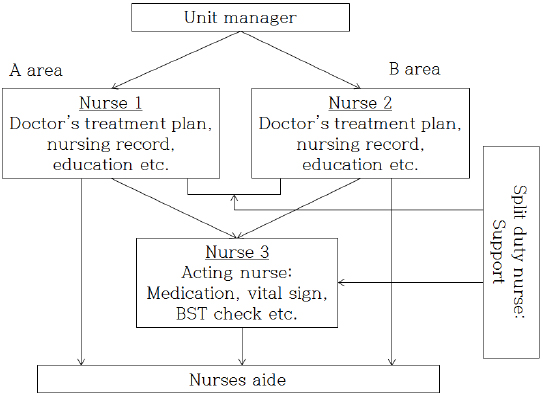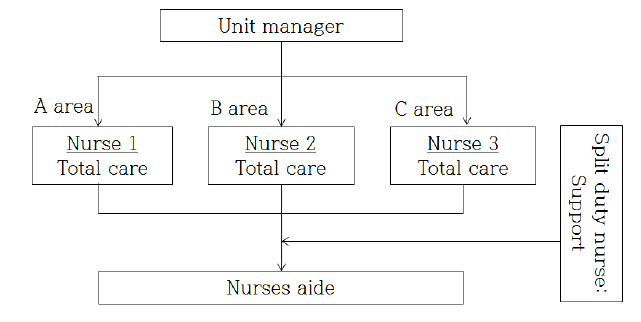J Korean Acad Nurs Adm.
2017 Jun;23(3):301-311. 10.11111/jkana.2017.23.3.301.
Effects of a New Nursing Delivery System on Nurses' Satisfaction, Self-efficacy, Job Stress, and Nursing Performance in a University Hospital
- Affiliations
-
- 1Department of Nursing Science, Chungbuk National University, Korea.
- 2Chungbuk National University Hospital, Korea. eunhatn@gmail.com
- KMID: 2386843
- DOI: http://doi.org/10.11111/jkana.2017.23.3.301
Abstract
- PURPOSE
The purpose of this study was to identify effects of moving from a functional method of nursing care delivery to a modified team nursing delivery system.
METHODS
A structured self-report questionnaire was used to measure satisfaction with the nursing delivery system, self-efficacy, job stress and nursing performance. Participants were 72 nurses working at a university hospital and data were collected three times; before, one month and three months after the modification to a modified team nursing delivery system. Data were analyzed using repeated measure ANOVA.
RESULTS
Satisfaction with the nursing delivery system increased significantly after the change to the modified team nursing method. There were no significant differences in self-efficacy, job stress, or nursing performance. However, satisfaction with the nursing delivery system and nursing performance increased and job stress decreased significantly in new nurses with less than 1 year experience.
CONCLUSION
Results indicate that a modified team nursing method has positive results on nurses' satisfaction, self-efficacy, job stress, and nursing performance compared to the functional method. Effect of changing the nursing delivery system in the hospital suggests possibilities and directions for a modified nursing delivery system that would be useful in hospitals presently using the functional method.
MeSH Terms
Figure
Reference
-
1. Jung MS, Park KO, Kim SY, Kim EK, Kim EY, Kim JK, et al. Nursing management. 2nd ed. Seoul: Hyunmoonsa;2016. p. 1–391.2. Organisation for Economic Co-operation and Development. Health care resources: Hospital beds [Internet]. Paris: Organisation for Economic Co-operation and Development;updated October 7, 2016. cited April 7, 2017. Available from: http://stats.oecd.org/Index.aspx?DataSetCode=HEALTH_REAC.3. Hwang JS, Yu BN. In search of strategic management for PFV (Patient Focus Value) in Korean hospitals. Korea Bus Rev. 2006; 44:331–348.4. Tiedeman ME, Lookinland S. Traditional models of care delivery: What have we learned. J Nurs Adm. 2004; 34(6):291–297.5. Oh ES. Autonomy level of nurse according to nursing delivery system. Korean J Occup Health Nurs. 2000; 9(2):155–165.6. Kim SS, Chae GS, Kim KN, Park KO, Moon SM. Survey on nursing care delivery systems of university affiliated hospitals in Korea. J Korean Clin Nurs Res. 2010; 16(1):167–175.7. Kim JY, Park BH, Ko YK. The status nursing care delivery system and the influencing factors on quality of nursing care. Korean J Hosp Manag. 2016; 21(2):24–36.8. Adams A, Bond S, Hale CA. Nursing organizational practice and its relationship with other features of ward organization and job satisfaction. J Adv Nurs. 1998; 27(6):1212–1222. DOI: 10.1046/j.1365-2648.1998.00657.x.9. Ji AN. The effects of team nursing system on nursing performance at a general hospital [master's thesis]. Wonju: Yonsei University;2002.10. Park YJ, Lee SJ, Jang SO. The second study on the effectiveness of nursing organization. J Korean Acad Nurs. 1997; 27(2):253–263.11. Thomas LH. A comparison of the verbal interactions of qualified nurses and nursing auxiliaries in primary, team and functional nursing wards. Int J Nurs Stud. 1994; 31:231–244. DOI: 10.1016/0020-7489(94)90049-3.12. Reed SE. A comparison of nurse-related behaviour, philosophy of care and job satisfaction in team and primary nursing. J Adv Nurs. 1988; 13(3):383–395. DOI: 10.1111/j.1365-2648.1988.tb01433.x.13. Park YJ, Lee SJ, Chang SO, Lee ES. Study on the effectiveness of nursing organization of one tertiary hospital. J Korean Acad Nurs Adm. 1997; 3(2):109–122.14. Choi EH, Lee HS, Kim JH, Ko MS, Kim BS. Effect of changes in nursing delivery system on satisfaction of nurses and patients and direct nursing time. J Korean Acad Nurs Adm. 2013; 19(2):217–226. DOI: 10.11111/jkana.2013.19.2.217.15. Slavitt DB, Stamps PL, Piedmont EB, B . Hasse AM. Nurses' satisfaction with their work situation. Nurs Res. 1978; 27(2):114–120.16. Kim HK. Nursing care delivery system satisfaction, job performance, turnover intention and nursing organizational culture in the nurses in university hospitals [master's thesis]. Seoul: Catholic University;2009.17. Sherer M, Maddux JE, Mercandante B, Prentice-Dunn S, Jacobs B, Rogers RW. The self-efficacy scale: Construction and validation. Psychol Rep. 1982; 51(2):663–671. DOI: 10.2466/pr0.1982.51.2.663.18. Chang SJ, Koh SB. Development of the Korean Occupational Stress Scale (KOSS). Korean J Stress Res. 2005; 13(3):183–197.19. Park YJ, Lee SJ, Chang SO. The second study on the effectiveness of nursing organization. J Korean Acad Nurs. 1997; 27(2):253–263.20. Lee JH, Lee SA, Ham YH, Yang MJ, Kim OS. Nursing delivery system improvement plan in a hospital. J Korean Soc Qual Assur Health Care. 1996; 3(2):52–59.21. Lee SH. A study on the relationship between professional selfconcept, self-efficacy and job satisfaction in clinical nurses. J Korean Acad Adult Nurs. 2008; 20(1):10–20.22. Park HK. The structural equation modeling on job performance of clinical nurses [dissertation]. Busan: Kosin University;2013. 1–87.23. Lee SJ, Kang MK, Gwon SH, Song GH, Lee JH, Choi JR, et al. A study on job stress between experienced versus new nurse. Chung-Ang J Nurs. 2002; 6(1):89–99.24. Suominen T, Leino-Kilpi H, Merja M, Doran DI, Puukka P. Staff empowerment in Finnish intensive care units. Intensive Crit Care Nurs. 2001; 17(6):341–347. DOI: 10.1054/iccn.2001.1606.25. Korean Hospital Nurses Association. A survey on hospital nursing staffing (2015). Business report for Hospital Nurses Association. Seoul: The Association;2016.26. Bartels JE. Educating nurses for the 21st century. Nurs Health Sci. 2005; 7(4):221–225. DOI: 10.1111/j.1442-2018.2005.00249.x.
- Full Text Links
- Actions
-
Cited
- CITED
-
- Close
- Share
- Similar articles
-
- An Analysis of Nursing Competency affecting on Job Satisfaction and Nursing Performance among Clinical Nurses
- Effect of Head Nurses' Authentic Leadership on Nurses' Job Satisfaction and Nursing Performance: Focusing on the Mediating Effects of Empowerment
- Effect of Work Environment on Nursing Performance of Nurses in Hemodialysis Units: Focusing on the Effects of Job Satisfaction and Empowerment
- A Comparative Study on Job Stress and Satisfaction between Ward Nurses and Outpatient Nurses
- A Study of Nursing Tasks, Nurses' Job Stress and Job Satisfaction in Hospitals with No Guardians



